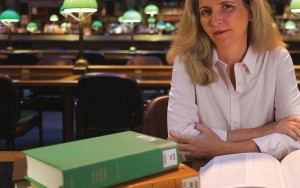New Statesman: The Ascent of Woman isn’t perfect – but it does let female expertise shine
Amanda Foreman’s documentary series The Ascent of Woman (Wednesdays, BBC2, 9pm) is full of ambition and lavishly produced – somehow the BBC budget has got her to Vietnam and China, India and Turkey, as well as to the door of the V&A in London. In tone, it harks back very deliberately to the glory days of Kenneth Clark’s Civilisation (1969) and Jacob Bronowski’s The Ascent of Man (1973) but with the crucial difference that barely a male face can be seen. During the third episode, when some pasty, bespectacled chap from the University of East Anglia was wheeled on to discuss the 16th-century obsession with witchcraft, I felt vaguely amazed, like I was watching a giraffe wander through my local park. Oh, how I cherish this almost total reliance on female expertise, one clever, learned woman following another, as if it were not at all unusual for women to be clever and learned (though it isn’t in life, most television still conspires to suggest otherwise).
About the material, however, I am less certain. Foreman is wonderfully even-handed, speaking out against the injustices that women have suffered even as she conjures up those few extraordinary females who won wars and ruled empires. I appreciate her determination to show things in full colour, rather than in black and white. Every age has its anomalies and their stories inevitably throw everything into relief.
Yet there is no doubting that her narrative loses its power as it inches closer to our own times and places. The early films covered territory that was, to me, unfamiliar: the Trung sisters of Vietnam who, in 40AD, led a rebellion against the Chinese domination of their homeland; Empress Wu Zetian, whose governance of China was so innovative and ruthless. Now Foreman has reached the Middle Ages and it’s all far less thrilling. She hasn’t much new to say about the Empress Theodora and, although this is probably my failing rather than hers, I find it difficult to think of Hildegard of Bingen as a feminist heroine.
What of Foreman’s style? Quiet and unshowy, unlike most BBC historians, she lets her research speak for itself. Not for her the wild gesticulation, the overemphatic delivery, the modelling of silly costumes. Nevertheless, one scene jarred. In the second film, faced with an inkwell that may or may not have belonged to the 11th-century Japanese writer Murasaki Shikibu, Foreman began to cry. I tried to tell myself that this was fine: if she is the kind of person who finds the life of the anonymous author (Murasaki Shikibu was a nickname) of The Tale of Genji so very moving, why shouldn’t she allow herself a little sob? But the truth is, it drove me nuts. It wasn’t only the preciousness of such a display of feeling that infuriated me (to repeat: she was looking at an inkwell). Much more vexing was that I can imagine no male presenter doing such a thing. In her shoes, I would have insisted on smelling salts and a retake.
If The Ascent of Woman feels like the kind of series the BBC was built to broadcast, then All Change at Longleat (Mondays, BBC1, 9pm) feels like one it has nicked from ITV. It’s all very Hello! magazine, though this isn’t to say that I’m not gripped. It has everything: a big house; an eccentric marquess and an altogether more smooth heir; 300 restless tenants; an ageing gorilla called Nico. Lord Bath and his son are on what amounts to non-speaks: having taken over the running of the pile, the viscount naughtily removed some of Pater’s smutty murals from its walls. Meanwhile, the marchioness, a Hungarian actress who lives off-site, has fallen out with her son since he married Emma, the daughter of a Nigerian oil trader.
I am fascinated by the viscount, whose name is Ceawlin, after the king of Wessex, and who looks and sounds like a cross between David Van Day of the pop group Dollar and Dale Winton (the BBC has nothing on me when it comes trashiness). His politeness in the face of his father’s petulance and countless mistresses – here’s one now, modelling a pink top hat that’s straight out of Mr Men – is a thing to behold, his smile every bit as impressively rigid as Lord Bath’s impasto nipples.

